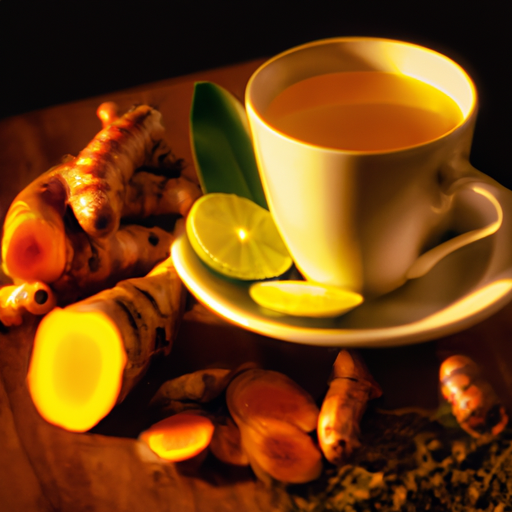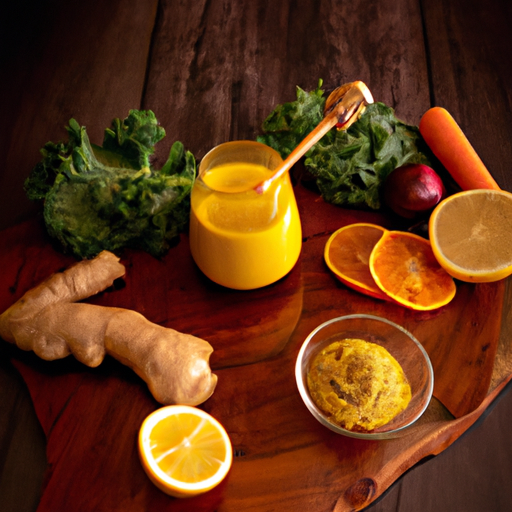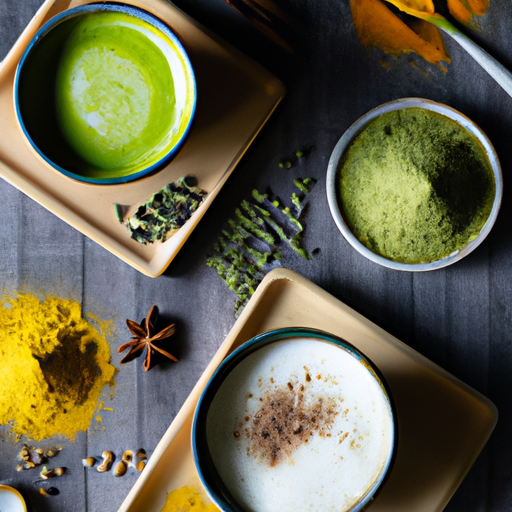Curious about how to enhance your brain power, ease inflammation, and aid digestion naturally? Explore the benefits of turmeric tea! Boost your health and vitality with this simple yet powerful remedy. Dive into the world of turmeric and discover the wonders it can do for your well-being. Explore a natural solution to support your body and mind. Ready to embark on a journey towards better health? Make turmeric tea your new go-to beverage for wellness and vitality.
This ancient beverage has been used for centuries in traditional medicine and is now gaining popularity in the Western world for its numerous health benefits.
Turmeric tea is made from the roots of the turmeric plant, which is native to India and Southeast Asia. The plant has been used for its medicinal properties in Ayurvedic and Chinese medicine for thousands of years.
In recent years, scientific studies have confirmed what these traditional systems of medicine have known all along: that turmeric tea contains compounds that can have powerful effects on your health.
In this article, we will explore the history and origins of turmeric tea, the active compound in turmeric, and the ways in which drinking turmeric tea can benefit your body and mind.
Key Takeaways
- Drinking turmeric tea can improve brain function and memory, as curcumin, the active compound in turmeric, has been scientifically proven to have anti-inflammatory and antioxidant properties that can reduce the risk of brain diseases such as Alzheimer’s.
- Turmeric tea can aid in digestion by reducing inflammation, stimulating bile production, and improving gut health, which can potentially help with weight loss and reduce digestive issues such as irritable bowel syndrome (IBS).
- Turmeric tea can support immune system health by containing compounds with immune-boosting properties, leading to a stronger immune response and better protection against diseases.
- It’s important to consume turmeric tea in moderation, as drinking too much can lead to possible side effects such as stomach upset and nausea, and pregnant women should avoid it as it may stimulate the uterus and cause contractions. It’s also important to use high-quality turmeric to avoid any harmful contaminants or additives, and to consult with a doctor if you have a medical condition or are taking medication.
The History and Origins of Turmeric Tea
Did you know that turmeric tea has been consumed for centuries in traditional Ayurvedic medicine as a natural remedy for various ailments?
Turmeric is a plant that is native to Southeast Asia and has been used in Indian and Chinese medicine for centuries.
Turmeric tea’s cultural significance is deeply rooted in these medicinal practices, and it is believed to have many health benefits.
Turmeric plays a significant role in Ayurvedic medicine, which is a holistic approach to health that focuses on balancing the mind, body, and spirit.
In this practice, turmeric is used to treat a variety of conditions, including inflammation, digestive issues, and skin problems.
It is also believed to have antioxidant and anti-inflammatory properties, which may help reduce the risk of chronic diseases.
With all these benefits, it’s no wonder that turmeric tea has gained popularity in recent years.
Now, let’s delve into the active compound in turmeric: curcumin.
The Active Compound in Turmeric: Curcumin
You may be skeptical, but believe it or not, the active compound in turmeric, curcumin, has been scientifically proven to provide numerous health benefits.
Curcumin has been shown to have anti-inflammatory, antioxidant, and anti-cancer properties. It can help reduce inflammation in the body, which is the root cause of many chronic diseases such as arthritis, heart disease, and diabetes.
Additionally, curcumin can help boost brain function and lower the risk of brain diseases such as Alzheimer’s. However, it’s important to note that the curcumin dosage required to achieve these benefits is quite high and may not be achievable through diet alone. Therefore, it’s recommended to take curcumin supplements or drink turmeric tea, which contains a concentrated amount of curcumin, to reap the benefits.
Turmeric tea and inflammation go hand in hand, as the anti-inflammatory properties of curcumin can help reduce inflammation in the body. But how exactly does turmeric tea achieve this? Let’s delve into the topic further.
Turmeric Tea and Inflammation
The anti-inflammatory properties of curcumin found in turmeric make it an effective tool in reducing inflammation in the body. Inflammation is a natural response to injury or infection, but when it becomes chronic, it can lead to various health problems such as heart disease, cancer, and diabetes.
Turmeric tea can help reduce inflammation and potentially improve these conditions. It is a natural and safe remedy for reducing inflammation, unlike other anti-inflammatory drugs that may have side effects such as stomach ulcers and liver damage. However, it’s important to note that turmeric may interact with certain medications and should be used with caution.
Overall, incorporating turmeric tea into your diet can have numerous benefits for reducing inflammation in the body. As you move on to the next section about turmeric tea and brain function, it’s important to note that the benefits of turmeric tea extend beyond just reducing inflammation.
Turmeric Tea and Brain Function
Turmeric tea can improve cognitive function. A study found that adults who consumed curcumin supplements had a 28% improvement in memory and attention compared to those who took a placebo. If you’re looking to boost your memory and cognitive function, incorporating turmeric tea into your daily routine may be a simple and natural solution. Here are three ways that turmeric tea can help with mental clarity:
-
Reducing oxidative stress: Turmeric contains antioxidants that can protect the brain from free radicals, which can damage cells and contribute to cognitive decline.
-
Anti-inflammatory effects: Chronic inflammation has been linked to a variety of health issues, including cognitive decline. Turmeric’s anti-inflammatory properties may help reduce inflammation in the brain, leading to improved cognitive function.
-
Increased blood flow: Turmeric has been shown to improve blood flow, which can increase oxygen and nutrient delivery to the brain. This improved circulation may help with memory and cognitive function.
Boosting memory and cognitive function with turmeric tea is just one of the many benefits of this powerful spice. Next, let’s explore how turmeric tea can aid in digestion.
Turmeric Tea and Digestion
If you’re looking for a natural way to improve your digestive health, turmeric tea may be just what you need. For centuries, turmeric has been used in traditional medicine to alleviate digestive issues, from bloating and gas to more serious conditions like inflammatory bowel disease. The science backs up these claims: research has shown that the active compounds in turmeric can help soothe inflammation in the gut and improve overall digestive function.
So if you’re curious about the digestive benefits of turmeric tea, read on to learn more about the studies that have been done on this powerful herb.
The Role of Turmeric in Traditional Medicine for Digestive Issues
Experience relief from digestive issues by incorporating turmeric into your traditional medicine routine. Turmeric has been used for centuries in traditional remedies for its medicinal properties, particularly for digestive health.
In herbal medicine, turmeric is known for its ability to reduce inflammation, which can help alleviate symptoms of digestive problems such as bloating, gas, and constipation. Turmeric also stimulates the production of bile, which aids in the breakdown of fats and improves digestion. Its natural anti-inflammatory and antioxidant properties can also help soothe the gut lining and reduce irritation.
Incorporating turmeric into your traditional medicine routine can be a safe and effective way to improve your digestive health. As you learn more about the benefits of turmeric for digestion, you may wonder how it works on a scientific level. The next section will dive deeper into the science behind turmeric’s digestive benefits.
The Science Behind Turmeric’s Digestive Benefits
Congratulations, smarty pants! You wanna know the science behind how turmeric tea can soothe your gut and make ya feel better.
Well, turmeric contains a compound called curcumin which has anti-inflammatory properties. Inflammation in the gut can cause digestive issues such as bloating, gas, and discomfort. Curcumin can reduce this inflammation, improving overall gut health and digestion.
Turmeric tea can also stimulate the production of bile, a substance produced by the liver that helps digest fats. Bile is stored in the gallbladder and released when we eat a fatty meal. The curcumin in turmeric tea can increase the production and release of bile, making it easier for your body to digest fats and reducing the likelihood of digestive discomfort.
So, if you’re looking to improve your digestive health, adding turmeric tea to your routine may be beneficial.
Next, let’s dive into some studies on the digestive effects of turmeric tea.
Studies on the Digestive Effects of Turmeric Tea
Let’s explore some studies that shed light on how turmeric tea can benefit your digestive system.
Firstly, turmeric tea has been found to aid in weight loss. A study published in the Journal of Nutrition and Metabolism found that consuming a supplement containing curcumin, the active ingredient in turmeric, led to significant reductions in body weight and body fat. This is because curcumin has been shown to increase the production of bile, which helps to break down fat in the body.
In addition to its weight loss benefits, turmeric tea can also improve gut health. A study published in the Journal of Medicinal Food found that curcumin can help to reduce inflammation in the gut, which can lead to a variety of digestive issues such as irritable bowel syndrome (IBS). Furthermore, curcumin has been shown to increase the production of beneficial bacteria in the gut, which can improve overall gut health.
With these benefits in mind, let’s now explore how turmeric tea can also support immune system health.
Turmeric Tea and Immune System Health
If you’re looking to boost your immune system, turmeric tea may be a natural solution worth considering. Traditional medicine has used turmeric for centuries to support immune function, and now modern science is starting to understand why.
Studies have shown that turmeric contains compounds with immune-boosting properties that may help protect against illness and disease.
The Role of Turmeric in Traditional Medicine for Boosting Immunity
Although some may doubt the effectiveness of turmeric in traditional medicine, it has been used for centuries in Ayurvedic practices to boost immunity and fight against infections. Traditional remedies often rely on the natural healing properties of plants, and turmeric is no exception.
It contains a compound called curcumin, which has been shown to have anti-inflammatory and antioxidant properties. These properties can help boost the immune system by reducing inflammation in the body and fighting against harmful free radicals.
In addition to its immune-boosting properties, turmeric has also been used in traditional medicine to treat a variety of ailments, including digestive issues, skin problems, and even depression. However, it’s important to note that while traditional remedies can be effective, they shouldn’t be used as a substitute for modern medical treatments.
It’s always best to consult with a healthcare professional before trying any new remedies or supplements. With that being said, let’s delve into the science behind turmeric’s immune-boosting properties.
The Science Behind Turmeric’s Immune-boosting Properties
Now that you know about the role of turmeric in traditional medicine for boosting immunity, let’s dive into the science behind turmeric’s immune-boosting properties.
Turmeric contains compounds called curcuminoids, with curcumin being the most studied and potent. Curcumin has been shown to have a variety of immune-boosting mechanisms, including reducing inflammation, increasing antioxidant levels, and modulating immune cells.
To help paint a better picture of turmeric’s immune-boosting properties, here are four ways it can support your immune system:
- Curcumin can help reduce inflammation in the body, which can lead to a stronger immune response.
- Curcumin can increase the activity of antioxidant enzymes in the body, which can help protect immune cells from damage.
- Curcumin can modulate immune cells, including T cells, B cells, and natural killer cells, which are vital for fighting infections.
- Turmeric’s bioavailability can be improved by consuming it with black pepper, which contains piperine. Piperine can increase the absorption of curcumin by up to 2000%.
Understanding the immune-boosting mechanisms of turmeric and curcumin can help you make informed decisions about incorporating it into your daily routine. In the next section, we’ll explore studies on the immune system effects of turmeric tea.
Studies on the Immune System Effects of Turmeric Tea
Discovering the immune-boosting effects of turmeric tea has been the subject of several scientific studies. One study published in the Journal of Clinical Immunology found that curcumin, the active ingredient in turmeric, can modulate the immune system by regulating cytokines. Cytokines are small proteins that play a crucial role in inflammation and immune response. The study observed that curcumin can reduce the production of pro-inflammatory cytokines while increasing the production of anti-inflammatory cytokines. This immune modulation effect of curcumin can potentially benefit individuals with autoimmune diseases, allergies, and other inflammatory conditions.
Another study published in the Journal of Ethnopharmacology found that turmeric tea can enhance the immune system by increasing the activity of natural killer cells. Natural killer cells are a type of immune cell that plays a critical role in fighting infections and cancer cells. The study observed that regular consumption of turmeric tea can increase the number and activity of natural killer cells, leading to a stronger immune response and better protection against diseases.
Incorporating turmeric tea into your daily routine can potentially be a simple and effective way to support your immune system.
Now that you know how turmeric tea can benefit your immune system, let’s move on to the next section and learn how to make it at home.
How to Make Turmeric Tea
To prepare turmeric tea, you’ll need to combine hot water, turmeric powder, black pepper, honey, and lemon juice. Turmeric has numerous health benefits, and turmeric tea is a great way to incorporate this spice into your daily routine.
The best time to drink turmeric tea is in the morning, as it can help boost your metabolism and energy levels. Drinking turmeric tea before bedtime can also improve your sleep quality.
To make turmeric tea, boil water and add a teaspoon of turmeric powder and a pinch of black pepper. Stir the mixture and let it simmer for around 10 minutes. Once done, strain the tea and add a spoonful of honey and a squeeze of lemon juice. You can adjust the sweetness and acidity according to your preference.
However, it’s important to note that drinking too much turmeric tea can lead to possible side effects such as stomach upset and nausea.
Possible Side Effects of Drinking Turmeric Tea
Be aware of the possible side effects of turmeric tea, as excessive consumption may cause stomach upset and nausea. While turmeric is generally safe to consume in small quantities, consuming large amounts may lead to more serious side effects such as gallbladder contractions, increased risk of bleeding, and liver damage.
It’s recommended that you consume no more than one to three grams of turmeric per day to avoid these potential side effects. To ensure safe consumption of turmeric tea, it’s important to stick to the recommended dosage and not exceed it.
If you experience any adverse effects, it’s best to stop consuming turmeric tea and consult with a healthcare professional.
In the next section, we’ll discuss precautions to take when drinking turmeric tea to ensure safe and effective use.
Precautions When Drinking Turmeric Tea
When consuming turmeric tea, it’s important to follow the recommended dosage and take necessary precautions to ensure safe and effective use. While turmeric tea is generally safe to drink, consuming excessive amounts may lead to potential risks. Here are some precautions to take when drinking turmeric tea:
| Precautions | Description |
|---|---|
| Limit intake | Consuming large amounts of turmeric tea may cause upset stomach, diarrhea, or nausea. |
| Consult with a doctor | If you have a medical condition or are taking medication, it’s important to consult with your doctor before consuming turmeric tea. |
| Use high-quality turmeric | Ensure that you are using high-quality turmeric to avoid any harmful contaminants or additives. |
| Avoid during pregnancy | Pregnant women should avoid drinking turmeric tea as it may stimulate the uterus and cause contractions. |
By taking these precautions, you can safely enjoy the benefits of turmeric tea. However, if you experience any adverse reactions, it’s important to discontinue use and consult with a healthcare professional. In the next section, we will discuss how to incorporate turmeric tea into your daily routine.
Incorporating Turmeric Tea into Your Daily Routine
If you’re looking to incorporate turmeric tea into your daily routine, there are a few tips to keep in mind. First, make sure you’re using high-quality turmeric and following a recipe that balances the flavors and health benefits.
Additionally, there are many other ways to incorporate turmeric into your diet and health routine beyond just drinking tea. From adding it to smoothies and soups to using it topically for skincare, there are plenty of evidence-based ways to make turmeric a part of your lifestyle.
Tips for Making Turmeric Tea a Part of Your Lifestyle
Incorporating turmeric tea into your daily routine is a simple and flavorful way to boost your overall health and wellness. Here are some tips to help you make turmeric tea a part of your lifestyle:
-
Turmeric tea has numerous health benefits, such as reducing inflammation, improving brain function, and aiding digestion. You can experiment with different variations of turmeric tea, like adding ginger, honey, or lemon for added flavor and health benefits.
-
It’s best to drink turmeric tea in the morning or before bed to help with digestion and promote relaxation. You can also drink it throughout the day as a healthy alternative to other beverages. Aim to drink at least one cup of turmeric tea per day to reap its health benefits.
In addition to drinking turmeric tea, there are other ways to incorporate turmeric into your diet and health routine.
Other Ways to Incorporate Turmeric into Your Diet and Health Routine
There are plenty of delicious recipes that can help you incorporate turmeric into your diet and boost your overall health.
One way to do this is by adding turmeric to your smoothie. You can blend turmeric powder with fruits like bananas, berries, and pineapples to create a tasty and nutrient-packed drink.
You can also mix turmeric powder with almond milk, honey, and cinnamon to make a turmeric latte, which is a great alternative to coffee.
Another way to incorporate turmeric into your diet is by cooking with it. You can add turmeric powder to your scrambled eggs, stir-fries, soups, and stews. Turmeric is a versatile spice that can add flavor and color to any dish.
If you don’t like the taste of turmeric, you can take turmeric supplements. These supplements come in different forms like capsules, gummies, and powders. They’re easy to take and can provide you with the benefits of turmeric without having to cook with it.
Frequently Asked Questions
What are some common recipes or variations for turmeric tea?
Looking to vary your turmeric tea routine? Try golden milk, a mix of turmeric, milk, and honey, or a turmeric latte with frothed milk and spices. Both offer a tasty and healthful twist on plain turmeric tea.
Can turmeric tea be consumed by pregnant or breastfeeding women?
If you’re pregnant or breastfeeding, consult with your healthcare provider before consuming turmeric tea. While it has many potential health benefits, there is limited research on its safety for these populations.
Can turmeric tea interact with any medications or supplements?
Be cautious when taking turmeric tea with medications or supplements, as it can interact with blood thinners, diabetes medications, and stomach acid reducers. Consult your healthcare provider for dosage and frequency precautions.
How frequently should turmeric tea be consumed for desired health benefits?
To reap the health benefits of turmeric tea, consume it daily or every other day. The best time to drink it is in the morning or before bed. A recommended quantity is 1-2 teaspoons of turmeric powder per cup of water.
Are there any specific types or brands of turmeric that are recommended for making tea?
When choosing turmeric for tea, look for organic, non-irradiated brands. Flavor profiles vary, with some being more bitter than others. Experiment to find the taste you prefer.
Conclusion
Congratulations! You now know the amazing benefits of drinking turmeric tea. It’s a great addition to your daily routine due to its anti-inflammatory properties. Not only can it help reduce joint pain and swelling, but it can also improve brain function and aid digestion.
One anecdote that illustrates the power of turmeric tea is that of a woman who suffered from chronic joint pain for years. She tried different medications and remedies, but nothing seemed to work. After drinking turmeric tea for a few weeks, she noticed a significant reduction in her pain and swelling. She was amazed at how such a simple solution could have such a big impact on her quality of life.
So why not try incorporating turmeric tea into your daily routine? It’s easy to make and has numerous benefits. Just remember to consult with your doctor if you have any concerns or are taking any medications that may interact with turmeric.
With its delicious taste and health benefits, turmeric tea is a great way to support your overall well-being.










